Your marketing plan depends on your website in the busy real estate business. Mastering digital marketing in this business requires a dynamic online presence that attracts and engages potential clients. This thorough resource covers real estate digital marketing and offers effective strategies:
- Tailoring your website’s design to showcase properties effectively
- Utilizing social media platforms to cultivate a brand community
- Implementing targeted email campaigns for sustained engagement

Remember, every click is a potential client. With tools like Plerdy, you can delve deep into user behavior, optimizing your website for higher conversion rates and improved user experience. Elevate your digital marketing game and turn browsers into buyers.
Introduction to Digital Marketing in Real Estate
Real estate is constantly evolving. Thus, digital marketing is crucial. This industry markets properties online to buyers. Embracing digital marketing in real estate is about staying current and leading the pack in a highly competitive market.
Key elements include:
- Crafting engaging online content to highlight real estate listings
- Utilizing digital platforms for broader reach and visibility
- Developing interactive tools to connect with prospective buyers
Real estate professionals who harness the power of digital marketing unlock new opportunities. Integrating digital technology into real estate marketing, they offer immersive client experiences. Digitizing real estate marketing makes it more dynamic, targeted, and efficient. Real estate marketing is changing as property visibility and customer interaction rise.
Benefits of Digital Marketing in Real Estate
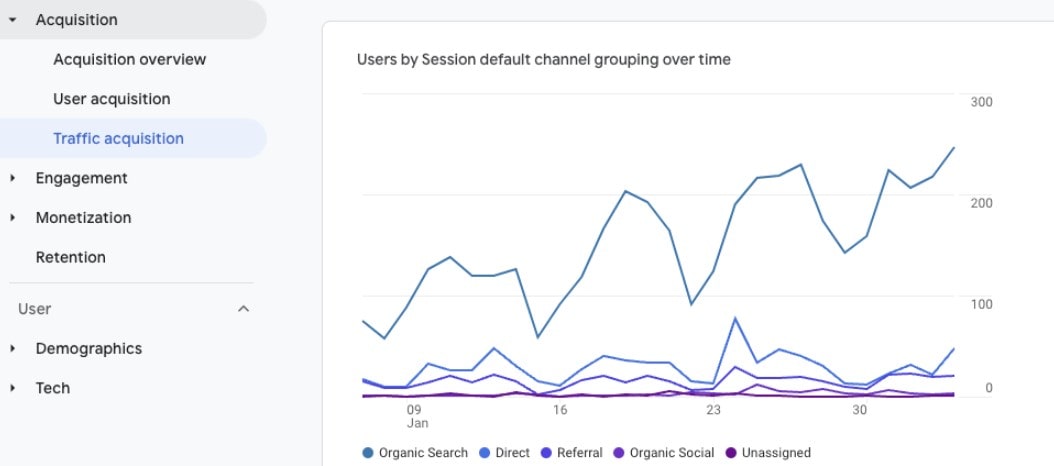
Digital real estate marketing is transformational. The combination of real estate and internet marketing has transformed property sales in the digital age. Here’s how:
- Enhanced Visibility: Digital marketing catapults real estate listings onto a global stage, increasing visibility exponentially.
- Targeted Reach: It enables real estate professionals to reach specific demographics, tailoring marketing efforts for maximum impact.
- Cost-Effectiveness: Digital property marketing is cheaper and more effective than traditional techniques.
- Real-Time Analytics: It provides real-time feedback and analytics, allowing for agile marketing adjustments.
- Interactive Experiences: Digital tools create interactive and immersive property showcases, engaging potential buyers more effectively.
Real estate agents may navigate the market more precisely and elegantly with digital marketing, changing how properties are displayed and viewed online.
Making Your Website a Priority
In the digital age, your website isn’t just a part of your real estate business; it’s the heart of your digital marketing strategy. Making your website a priority is akin to unlocking a treasure trove of marketing potential, especially in the real estate sector, where first impressions are everything. Here’s why prioritizing your website can transform your real estate marketing:
- First Point of Contact: Your website often serves as the initial meeting point between you and potential clients. It’s where digital marketing efforts converge, showcasing your real estate prowess.
- Showcasing Properties: A well-designed website is the perfect platform for displaying properties. High-quality images and virtual tours can turn casual browsers into interested buyers.
- Building Trust: In real estate, trust is paramount. A professional, user-friendly website establishes credibility, reassuring clients that they’re in capable hands.
- Generating Leads: Through effective digital marketing strategies like SEO and content marketing, your real estate website becomes a lead-generation machine, attracting potential buyers and sellers.
To reap these benefits, consider these priorities:
- Responsive Design: Ensure your website is mobile-friendly, catering to the growing number of users who browse on their smartphones.
- User Experience: A website that’s easy to navigate retains visitors longer, increasing the chances of conversion.
- Quality Content: To engage visitors provide valuable information about real estate trends, market analyses, and property guides.
Best Practices in SEO for Real Estate
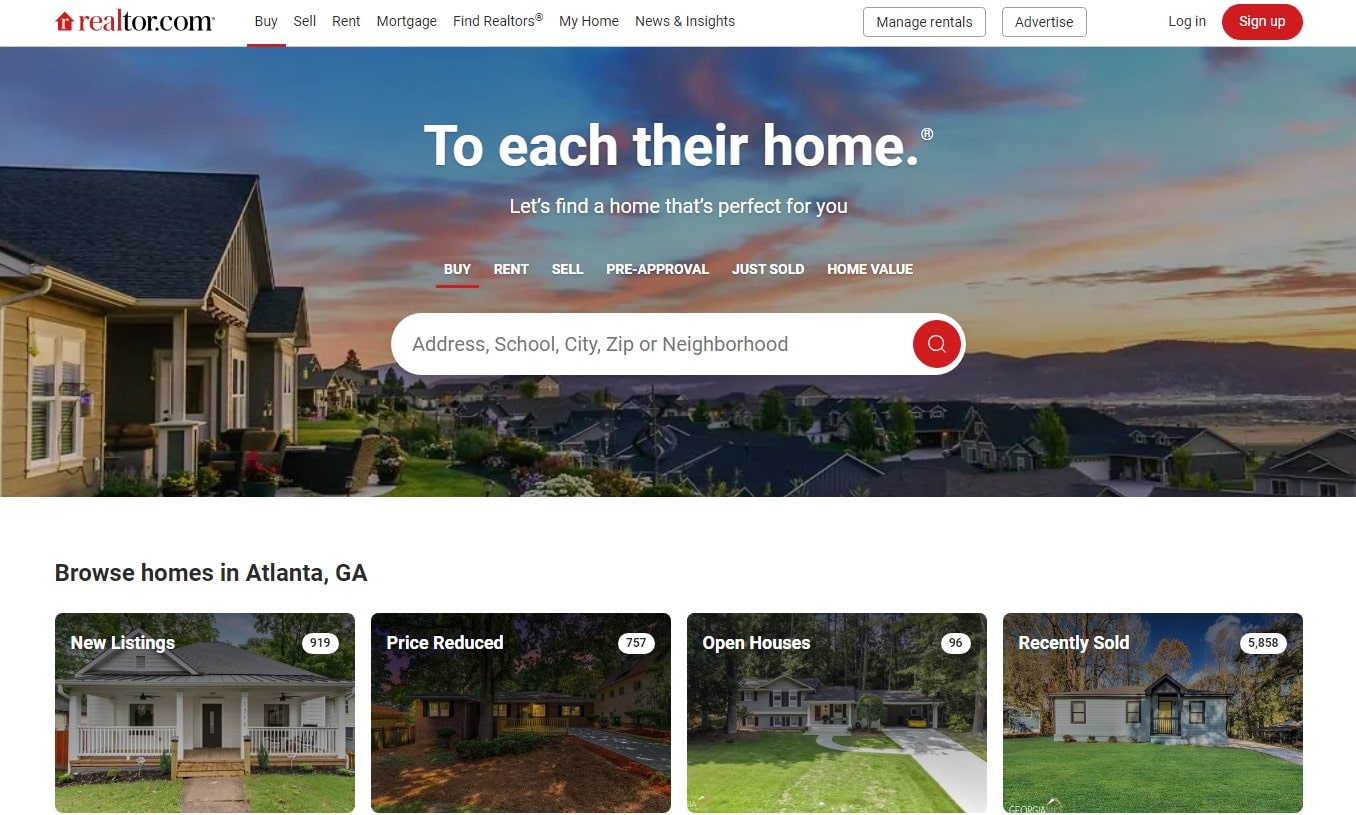
In the high-stakes world of real estate, digital marketing, especially SEO, is not just an option—it’s a necessity. Here’s how to elevate your real estate marketing with SEO best practices:
- Optimize for Local Searches: Real estate is inherently local, so your SEO should be too. Use local keywords in your digital content to capture the attention of potential clients in your area. For instance, “Miami real estate agent” or “homes for sale in Boston.”
- Create High-Quality Content: Quality content is a cornerstone of effective SEO. This includes writing detailed property descriptions, informative blog posts about the local real estate market, and tips for buyers and sellers.
- Mobile Optimization: With over 60% of searches coming from mobile devices, your real estate website must be mobile-friendly.
- Utilize Social Media: Social media sites like Instagram and Facebook are great places to advertise homes.
- Focus on User Experience (UX): You can improve your SEO position and decrease bounce rates with an easily navigable and informative website that keeps visitors engaged for longer.
- Track Your SEO Performance: Use tools like Google Analytics to track your website’s performance.
- Avoid Common SEO Pitfalls: Steer clear of tactics that can penalize your site, such as keyword stuffing, buying links, or duplicating content. These shortcuts can harm your site’s reputation and ranking in the long run.
In the digital realm of real estate, SEO isn’t just about being found; it’s about establishing trust and authority in a competitive market.
Leveraging Social Media for Real Estate
Real estate marketing relies heavily on social media in today’s digital era. Promoting properties, meeting new clients, and building a solid online presence are all possible through social media. Here’s how to effectively use social media in your real estate marketing strategy:
- Choose the Right Platforms: Focus on platforms like Facebook, Instagram, LinkedIn, and Twitter, where visual content and networking thrive. Each platform serves a unique purpose – from showcasing properties with stunning visuals on Instagram to networking with industry professionals on LinkedIn.
- Engage with Your Audience: Regular interaction with your followers builds relationships and trust. Get involved in niche-related conversations and reply quickly to comments and messages. This approach humanizes your brand and makes you more approachable.
- Showcase Your Properties Creatively: Use high-quality images and videos to showcase your listings. Virtual tours, aesthetically pleasing photographs, and engaging property descriptions can significantly boost your content’s appeal.
- Share Valuable Content: Share helpful hints for homebuyers and sellers, local news, and real estate market analysis. This positions you as a knowledgeable and reliable source in the industry.
- Utilize Social Media Advertising: Platforms like Facebook and Instagram offer targeted advertising options. Use these to reach a specific audience, like potential homebuyers in your area, and to promote listings more effectively.
- Consistency is Key: Regular posting keeps your audience engaged and your brand top of mind. Make a content calendar to ensure a consistent publication schedule.
- Leverage Influencer Partnerships: Collaborating with local influencers can expand your reach. Pick influencers whose audience fits well with yours.
- Monitor and Adapt: Use social media analytics to track the performance of your posts. Understanding what resonates with your audience helps refine your strategy for better results.
Incorporating these strategies into your real estate social media marketing can increase visibility, attract new clients, and establish a strong brand presence in the digital real estate market.
Content Development for Real Estate Marketing
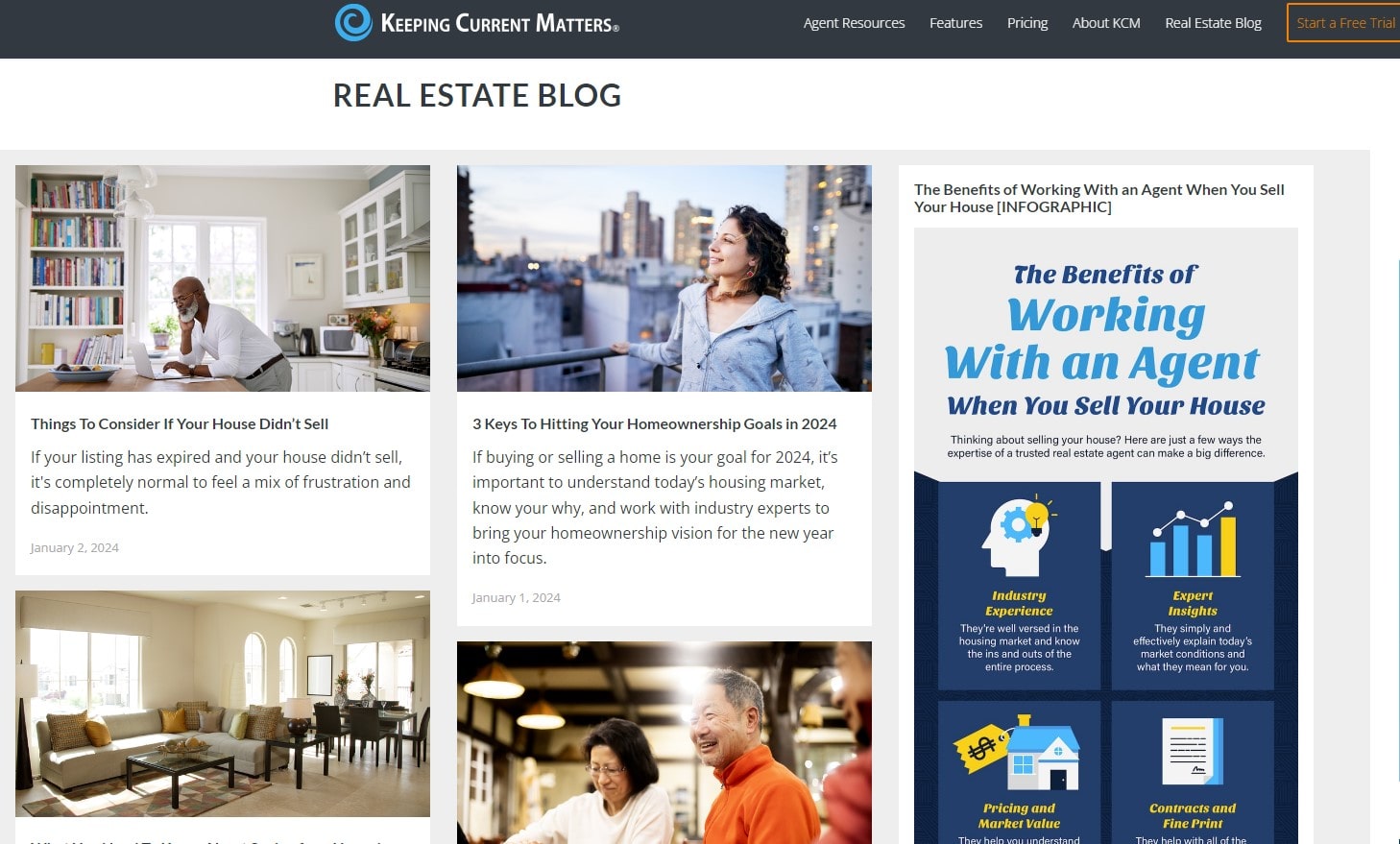
Content development is like building a digital strategy for real estate marketing. Content in the real estate industry should develop connections, provide insights, and guide potential clients. Here’s how you can excel in content development for real estate marketing:
- Understand Your Audience: Recognizing who you’re speaking to is vital. Who is searching for a house? First-time buyers, seasoned investors, or a forever family? Personalize your content to express their wants, worries, and goals.
- Showcase Local Expertise: Your content should demonstrate your local real estate expertise. Highlight local treasures, market trends, and events. Your local expertise helps clients picture life in a new area.
- Leverage Different Formats: Diversify your content. Incorporate blogs, videos, infographics, and virtual tours. Each format serves a purpose – blogs for detailed insights, videos for a realistic view of properties, infographics for quick facts, and virtual tours for an immersive experience.
- Educate and Inform: Offer value through your content. Give buyers buying advice, sellers staging advice, and market analysis. This educates and builds trust.
- Engage with Storytelling: People relate to stories. Tell client success stories, property transformations, or your real estate adventure. Humanizing your brand generates an emotional connection.
- Optimize for Digital Platforms: Ensure your content is optimized for different digital platforms – from your website to social media. Know each platform’s quirks and personalize your material.
Combining these methods with real estate marketing will boost your internet presence, expand your audience, and establish your digital authority.
Building Trust Through Social Proof
In today’s digital age, building trust in the real estate market hinges on effective marketing strategies, where social proof emerges as a cornerstone. This approach is crucial in real estate digital marketing, as it reassures clients.
Here’s how it can revolutionize trust-building in real estate:
- Showcase Customer Testimonials: There’s no marketing quite like word-of-mouth. Displaying client testimonials on your digital platforms offers prospects a genuine, relatable perspective. It’s like a neighbor’s advice, influencing decisions.
- Highlight Industry Accolades: Accreditations and awards in your marketing material act as stamps of approval from the industry. They discreetly endorse your real estate expertise and dedication.
- Leverage Client Success Stories: Share narratives of successful transactions. Showcase your problem-solving skills and passion by describing your solutions.
- Utilize User-Generated Content: Encourage clients to share their experiences on social platforms. It boosts your online visibility and authenticity.
These methods can greatly improve your real estate digital marketing by building audience trust and trustworthiness. Remember, in the real estate realm, trust is not just a value; it’s the foundation of every successful transaction.
Utilizing Virtual Tours in Property Showcasing
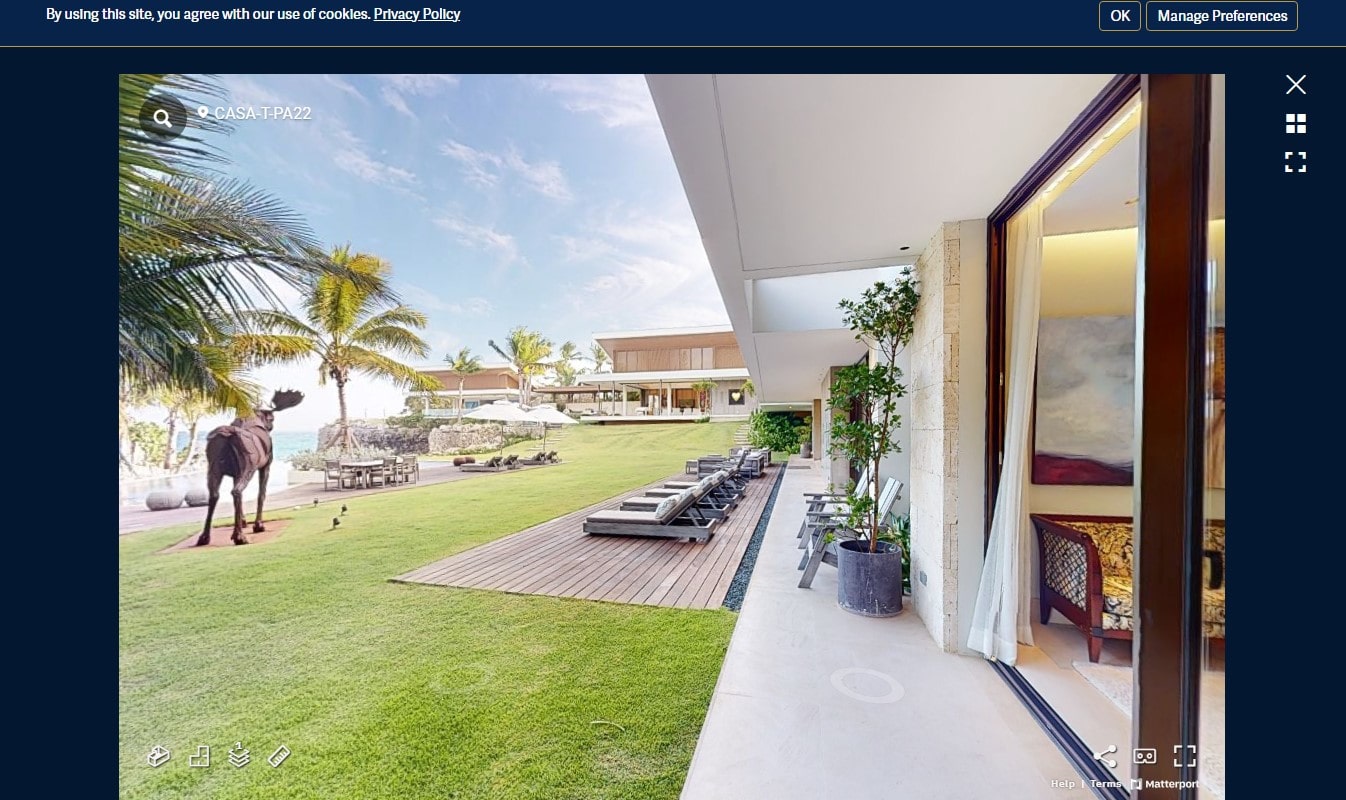
Digital marketing is changing real estate property presentation, and virtual tours are leading. Immersive virtual tours elevate real estate marketing. They’re essential because:
- Enhanced Visual Experience: Virtual tours offer a 360-degree view of properties, providing an immersive experience that static images can’t match. They allow customers to inspect every detail, ensuring every feature is noticed.
- Increased Reach and Engagement: Digital platforms hosting virtual tours expand the real estate market’s reach. Virtual tours increase clients and engagement by allowing global buyers to explore properties.
- Time and Cost Efficiency: Virtual tours save time and resources for both agents and clients. They streamline and lower costs by reducing in-person showings.
- Competitive Edge in Marketing: In the competitive real estate arena, offering virtual tours can set an agent apart. It attracts tech-savvy clients by using cutting-edge digital tools.
VR tours improve home displays and sales in real estate. Their digital property experience is complete and attractive because of convenience and technology.
Innovating with Real Estate Video Marketing
Innovative real estate video marketing highlights properties online. Why video marketing changes real estate:
- Captivating Visual Narratives: Videos bring property listings to life as compelling storytelling. This dynamic format tells a tale with properties instead of static visuals.
- Broadened Marketing Reach: Digital platforms amplify the reach of real estate marketing efforts. Realtors may reach global buyers by using video marketing.
- Enhanced Buyer Engagement: Videos engage buyers more deeply than traditional marketing methods. They create an emotional connection to the property through virtual reality, influencing purchases.
- Competitive Advantage: Innovative video marketing strategies can set a realtor apart in the competitive real estate market. This innovative method attracts modern buyers and sellers with its devotion to modern marketing.
Regarding selling and marketing properties, real estate video marketing is a game-changer. An engaging and successful virtual property showcase results from integrating technology, imagination, and planning.
Embracing Mobile Platforms in Real Estate
A new dynamic emerges as real estate agents and clients engage with the market through mobile platforms. Property searches, listing visibility, and communication have all been substantially enhanced by using this digital technology. Real estate agents use mobile apps to provide virtual tours and property details at the touch of a button to appeal to tech-savvy clients. This digital transformation boosts real estate brokers’ marketing and market position.
- Efficient Property Searches: Clients can filter and tailor searches, accessing many listings with detailed information and high-resolution images.
- Instant Communication: Enables immediate contact between clients and agents, simplifying queries and appointment scheduling.
- Real-Time Updates: Users receive prompt notifications about new listings, price changes, or open houses, keeping them abreast of market dynamics.
- Personalized Client Experience: Mobile platforms analyze user preferences, offering tailored property suggestions and enhancing the client-agent relationship.
- Document Management: Digital platforms streamline paperwork, from viewing agreements to signing contracts, facilitating quicker transactions.
Mobile platform adoption in real estate is much more than just keeping up with the times; it’s a calculated move to meet the needs of changing consumer habits. By adopting these systems, agents can improve their organization, responsiveness, and ability to meet client needs. One industry that has successfully adapted to the digital wave is real estate. By using mobile platforms, they have improved customer interaction and operational efficiency.
Personalizing Real Estate Email Marketing

Real estate clients must connect with digital marketing, notably email campaigns. Personalization is pivotal – it’s more than just addressing recipients by name; it involves crafting content that aligns with their real estate interests and goals.
- Segmentation: Divide your client list into buyers, sellers, and information seekers. Tailor content to fit each group’s interests.
- Local Insights: Offer local market trends and neighborhood updates particularly relevant to each client’s area of interest.
- Testimonials: Include success stories and client feedback. Personal anecdotes foster trust and trustworthiness.
- Interactive Content: Incorporate polls or quizzes to engage clients and gather their preferences for future communications.
- Responsive Design: Ensure emails are mobile-friendly, as many clients access their mail on digital devices.
Real estate brokers can gain much more from their digital marketing campaigns if they follow these steps. Personalized emails foster trust and help maintain a competitive edge in the dynamic real estate market.
Advantages of Marketing Automation in Real Estate
Digital marketing automation transforms real estate interactions and processes. Time savings aren’t the only benefit of this technology; it’s also about using digital resources to strengthen client relationships. Key advantages include:
- Streamlined Communications: Automated emails and social posts ensure consistent, timely client engagement. This is of the utmost importance for real estate in the age of technology.
- Efficient Lead Management: It segments and nurtures leads, reducing manual tracking and boosting engagement.
- Data-Driven Insights: Real-time analytics from automation tools enable informed strategy adjustments.
- Personalized Client Interactions: Important in digital marketing, personalized communications strengthen ties with clients.
- Optimized Time and Resources: Automation frees up time for realtors, redirecting focus to high-value tasks like client meetings.
Marketing automation is a strategic advantage that real estate agents need to compete in the digital economy.
The Power of Ad Retargeting in Real Estate
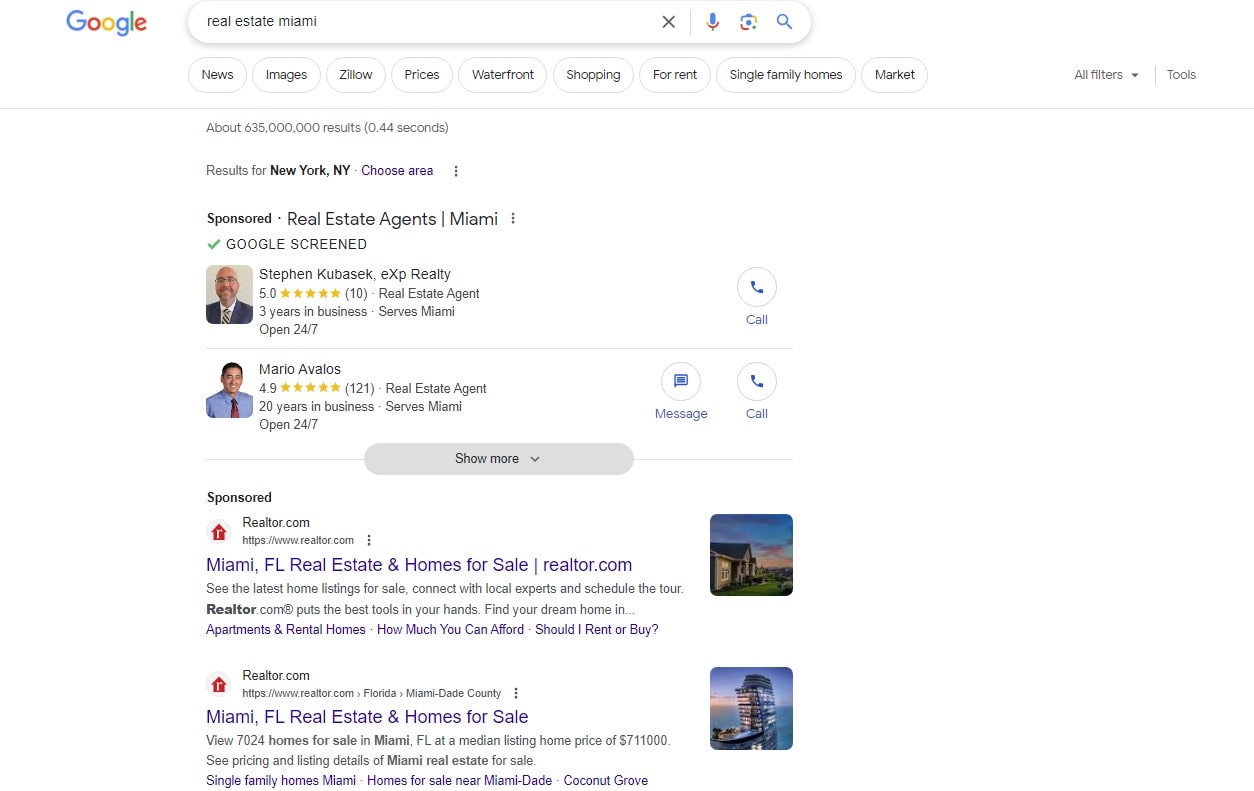
In the dynamic realm of real estate, ad retargeting emerges as a digital marketing game-changer. Here’s why:
- Enhanced Engagement: Targets potential clients who’ve previously shown interest, increasing the likelihood of engagement.
- Customized Approach: Tailors digital ads based on user’s prior interactions, ensuring relevance in the real estate context.
- Strategic Reminders: Keeps your real estate listings top-of-mind, gently nudging browsers back to your site.
- Cost-Effective: Ad retargeting in real estate maximizes marketing spend by focusing on interested individuals.
- Increased Conversions: This targeted approach often results in higher conversion rates, turning browsers into buyers or sellers.
In essence, ad retargeting in real estate is not just about reaching more people; it’s about reaching the right people at the right time with the right message.
Authenticity in Real Estate Digital Marketing
In today’s digital era, authenticity in real estate marketing isn’t just a buzzword—it’s a necessity. Here’s why:
- Genuine Connection: Authentic marketing resonates deeply, creating a bond between real estate professionals and their audience.
- Trust Building: Honest and transparent communication fosters trust, an indispensable element in the real estate business.
- Reflects Real Values: Authenticity ensures digital marketing mirrors real-world values and ethics.
- Long-term Relationships: Beyond immediate sales, authenticity cultivates enduring relationships with clients.
Authentic real estate digital marketing is about developing trust and genuine relationships, not just selling houses.
Conclusion
In the digital age, real estate marketing and sales have changed. Let’s examine real estate digital marketing’s winning strategies after introducing it.
- Targeted Approach: Real estate digital marketing relies on precision targeting. Reaching the correct audience is key in SEO and social media ads.
- Engaging Content: Successful digital marketing relies on high-quality, relevant content. Educational blogs, engaging virtual tours, and appealing property listings add value for potential clients.
- Seamless Integration: Integrating various digital channels ensures a cohesive marketing strategy. Social media and email marketing should function together.
- Analytics and Adaptation: Measurement and optimization make digital marketing powerful.
Remember that successful real estate digital marketing requires an engaging and instructional online presence and compelling stories for sellers and buyers. In the ever-changing real estate market, those who use digital marketing will stand out.
